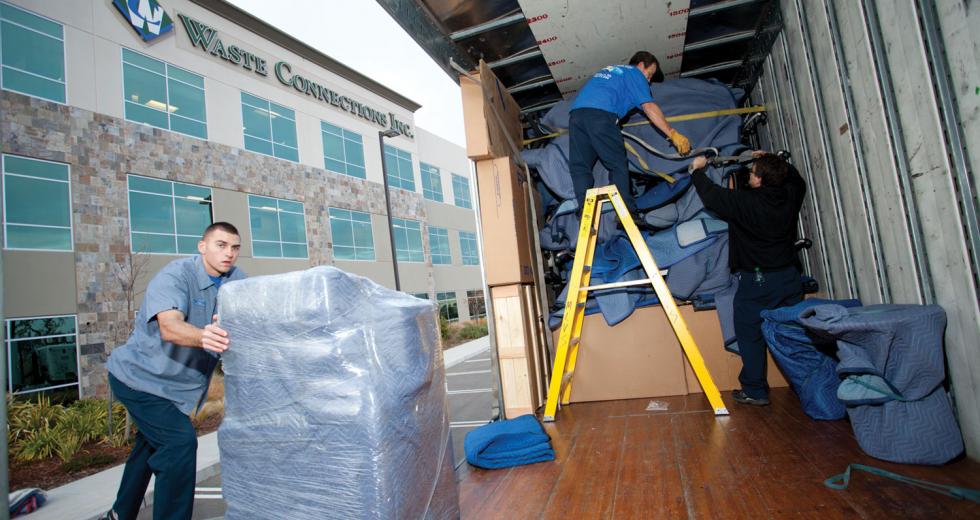There was a raucous debate on the political stage last year over whether California companies were giving up on the Golden State and moving to Texas.
The warning was magnified by Texas Gov. Rick Perry’s bragging about “job hunting” trips to California, luring CEOs with promises of a “lightning speed” permitting process. Concerns over Texas headhunting gained teeth in December as Waste Connections CEO Ron Mittelstaedt announced he was moving his Folsom company there while wagging his finger at the state’s regulatory climate.
Some media reports overstated the company’s primary reason for departure, but in a Comstock’s interview, Mittelstaedt said Waste Connections simply “outgrew” California by acquiring a larger presence among eastern states that required a more geocentric headquarters. Other reports suggested the impact on local jobs was larger than the 130 employees who agreed to relocate to Texas.
Mittelstaedt became the face of local businesses strangled by the California Environmental Quality Act and willing to do something about it. The complaint, which is echoed throughout the construction industry, is that excessive environmental standards inflate the price of developer permits while making companies vulnerable to frivolous lawsuits for alleged noncompliance.
“The California Environmental Quality Act is by far the most redundant, arduous and bureaucratic process from a development standpoint anywhere in the country,” Mittelstaedt says. “The permit for new development is probably five times more expensive in California, and the construction needed to comply with the permit is probably three to four times more expensive.
“It creates an endless litigation loophole where people are encouraged to file litigation because there is no recourse.”
Under CEQA, some private companies must identify the major environmental effects of their project and demonstrate mitigation plans. A company’s report can be challenged in court by virtually anyone. California is one of three states — New York and Washington are the others — that apply a similar standard on private projects.
Texas, on the other hand, has lax environmental and tort policies, Mittelstaedt says. The company also was lured to the Lone Star State because the cost of living is about 25 percent lower, there is a wider selection of career options for relocated spouses, and private K-12 schools have a greater presence, Mittelstaedt says.
Texas also has no corporate income tax or personal income tax, which certainly helped the state win the top ranking in the 2011 Best/Worst States for Business Survey by Chief Executive magazine. For seven consecutive years, California has ranked at the very bottom of that index, which asks 550 CEOs to write down the four best and worst states for business, based on taxation, regulation, workforce quality and living environment.
“Look at any industry, (CEQA) is one of the reasons there is no development going on in California,” Mittelstaedt says. “Out of 31 states we do business in, 81 percent of our legal expenses are occurring in California.”
While California boasts even stricter standards for air pollution and greenhouse gases than the rest of the country, Republican lawmakers in Texas have historically fought to pare down federal environmental requirements. In a 2011 report by the Natural Resources Defense Council, Texas ranked 13th out of the 20 most toxic states for air pollution by power plants. California did not make the list.
At the time of departure, Waste Connections was one of the fastest growing public companies based in the Capital Region. Since Mittelstaedt founded the company in 1997, it has completed more than 300 acquisitions and currently operates in more than 100 municipalities.
The company’s recently released annual report shows Waste Connections made record revenue in 2011 of $1.51 billion and annual profits of $165.2 million, or $1.45 per share, reflecting a profit increase of about 18 percent from last year. Despite the move, Waste Connections predicts revenues will rise to $1.61 billion this year. The relocation will not disrupt any local operations, but it is expected to cost the company $15 million, and Waste Connections also may incur a loss of up to $6 million on its property lease, according to filings with the U.S. Securities and Exchange Commission.
Mittelstaedt stresses the region will lose out on the tens of millions of dollars in revenue Waste Connections spends annually on hotel rooms, car rentals and fine dining for employees, since the Folsom headquarters served as the company’s national training ground.
SEC filings also show that in 2009 Waste Connections was named a “real party of interest” in a lawsuit filed by the Sustainability, Parks, Recycling and Wildlife Legal Defense Fund against Solano County for failing to comply with Measure E, the 1984 ballot initiative that caps at 95,000 tons per year the amount of solid waste Solano can receive from outside counties.
The dump in question is the Potrero Hills Landfill, which borders a large wetland environmental groups say is a key resting spot for migrating birds. The defense fund sought to overturn the permit that would have expanded the landfill and the accompanying environmental impact report, which the group said violated CEQA. Waste Connections also sought state legislation to overturn Measure E, but following a dispute over amendments, the bill died last year in the Senate.
“We understand that the regulatory environment is different in Texas. We’re trying to do what we can to gain a competitive edge. And at the same time, California has great advantages as well, and I think we need to take advantage of them,” said Senate President Pro Tem Darrell Steinberg (D-Sacramento) in a December radio interview with KFBK.
Representatives for the defense fund could not be reached, but Joel Reynolds, an attorney with the Natural Resources Defense Council, has launched numerous lawsuits related to CEQA and says the law bolsters the economy by keeping California a pleasant place to live.
“There is no evidence to show that CEQA costs more jobs than it creates,” he says. “We come here because we like to live here, and one reason is that it’s a state that cares about environmental quality.”
When asked about the potential for frivolous lawsuits, Reynolds says court and attorney fees generally dissuade attorneys from pursuing litigation of dubious merit. He also notes a statute enacted a couple years ago that allows a court to sanction an attorney up to $10,000 for bringing forward a frivolous CEQA-related lawsuit.
Leaders of other industries that have navigated CEQA-related challenges wonder if the requirements could be streamlined without sacrificing the environment.
“It’s essential that our environment be protected, but we have to be realistic that CEQA has a bigger emphasis on binders and paper. One permit can eat up a quarter of someone’s career,” says Dana Davis, president of Teichert Materials, stressing that he is not speaking for the company but rather as an individual who has watched a single permit take more than a decade and cost millions of dollars.
Davis says he envisions a system in which cities draw environmental regulations into a general plan, and projects that fit the framework move quickly through the process. With a stronger articulation of environmental criteria, Davis explains, the potential for lawsuits against individual companies would be diminished.
Gov. Jerry Brown signed legislation last year allowing projects with an investment of $100 million or more to pass through an expedited CEQA review if the company commits to certain environmental standards. Legislative Republicans in both chambers opposed Assembly Bill 900, however, because they felt the legislation’s scope was too narrow.
During state budget negotiations last year, the GOP floated Senate Bill 195, which would have streamlined CEQA for smaller projects. But the bill was held when Brown gave up on Republican support and moved forward with an all-cuts budget. SB 195 is still alive and may resurface this year. Another recently introduced bill is AB 598 by Assemblywoman Shannon Grove (R-Bakersfield), which would allow only the attorney general to file lawsuits alleging CEQA noncompliance.
While it is unknown if the governor and the Legislature will further curtail CEQA to retain California business, it is notable that as mayor of Oakland Brown unsuccessfully attempted to exempt the city’s downtown from the regulation and has more recently indicated his unease with the process. Last year while celebrating legislation to expedite construction of a Los Angeles football stadium, the governor said, “There are too many damn regulations.”
For more information on Mike Graff:
www.mikegraffphoto.com
Recommended For You

City Strategy
Acuity With John Shirey
John Shirley, 63 was hired as Sacramento’s city manager in September 2011. Previously, he served as executive director of the California Redevelopment Association. As city manager, he overseas a $1 billion city budget and a staff of nearly 4,000.

Eat it Up
Why you should salivate over Sacramento’s farm-to-fork mantra
In October of last year, Sacramento Mayor Kevin Johnson declared Sacramento the “Farm-to-Fork Capital of America,” presenting the city with a long-term opportunity to build a distinct brand identity that could help the region attract and retain citizens, conventions, tourists and entrepreneurs. It’s especially valuable because a strong regional identity gives energy to the economic engines that make cities successful. Anyone needing proof can look directly to Austin, Texas.




Comments
I completely agreed with the term that, private companies should responsible for the major environmental effects of their project. Therefore, they should take beneficial steps to deal with these issues; otherwise, mostly people and community will facing problems related to environmental issues. So under environmental law act, every company should follow some rules and regulation regarding environmental effect.